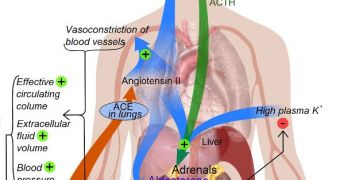As the population of the developed world ages, the incidence of Alzheimer's disease in general is bound to increase as well. Given the costs associated with handling the condition, its stands to reason that experts would be looking for cures around the clock. A new approach is now being tested in the UK.
Scientists at the University of Bristol are investigating the possible application of hypertension and high blood pressure medication to the treatment of Alzheimer's disease (AD). The latter is a neurodegenerative form of dementia that is currently lethal.
In the United Kingdom alone, the number of AD patients will increase from 500,000 to 1 million within the next two decades, according to official estimates. As such, the need to develop viable ways of detecting the condition early and treating it afterwards is growing at an ever-accelerating pace.
The drugs the UB team researches are destined to affect a particular biochemical pathway called the renin angiotensin system. Researchers at the university believe that, if successful, their study could also be applied to a wider range of types of dementia, called vascular dementia.
This investigation was made possible by funds secured from the North Bristol NHS Trust. Details of the results were published in the latest online issue of the esteemed Journal of Alzheimer's Disease.
Former studies by Dr. Patrick Kehoe constituted the basis of the new work. The expert holds an appointment as a Reader in Translational Dementia Research at UB, and is also the co-leader of the Dementia Research Group at Frenchay Hospital, in Bristol.
Kehoe – a worldwide authority on the renin angiotensin system – says that this particular biochemical pathway plays an important role in blood pressure regulation. However, not many research time dedicated time and effort to investigating the link between hypertension and dementia.
Still, in recent years, researchers were able to determine that some of the neural damages often seen in the brains of Alzheimer's patients were produced by this pathway. Some of the effects included memory loss, high levels of brain inflammation, reduced blood and oxygen circulation, and cell death.
“Drugs that can prevent Alzheimer’s occurring at all, or delaying its onset would have a substantial benefit on the lives of future sufferers, their families, as well as an overstretched health care system,” Kehoe reveals.
“Current Alzheimer’s drugs treat memory loss by attempting to correct chemical imbalances in the brain but these only work for a limited time. This limited treatment period is because the drugs are unable to stop the underlying mechanisms that cause the disease,” he adds.
“Therefore the need to find new ways of stopping Alzheimer’s goes on,” the investigator concludes.

 14 DAY TRIAL //
14 DAY TRIAL //